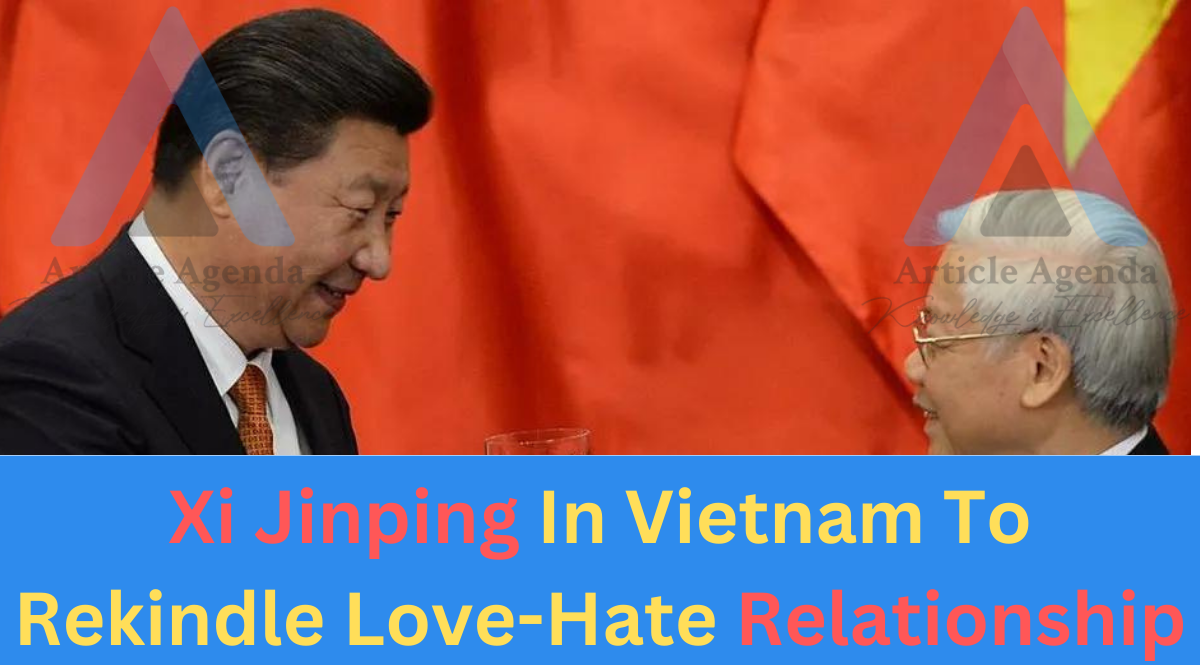Introduction to the love-hate relationship between China and Vietnam
China and Vietnam share a complex and often tumultuous Love-Hate relationship, characterized by a delicate balance of love and hate. This intricate dynamic has its roots in a long and storied history that has shaped the interactions between these two neighboring nations. From ancient conflicts to modern economic ties, the China-Vietnam relationship has been marked by a constant ebb and flow of emotions. As Xi Jinping, the President of China, embarks on a visit to Vietnam, it presents an opportunity to examine the love-hate relationship between these two countries and its implications for the future.
Table of Contents
- Introduction to the love-hate relationship between China and Vietnam
- Historical background of the China-Vietnam love-hate relationship
- Factors contributing to the love-hate dynamics
- Recent developments in the China-Vietnam relationship
- Xi Jinping’s visit to Vietnam
- Analysis of the purpose and goals of Xi Jinping’s visit
- Potential outcomes and implications of the visit
- Public opinion on the China-Vietnam relationship
- Strategies for managing a love-hate relationship
- Conclusion and prospects for the China-Vietnam love-hate relationship
Historical background of the China-Vietnam love-hate relationship
The history of the China-Vietnam relationship can be traced back thousands of years. The Chinese empire exerted its influence over Vietnam, then known as Annam, during the period of the Han dynasty. However, Vietnamese resistance to Chinese domination eventually led to the establishment of an independent state. Over the centuries, China continued to exert its influence over Vietnam through various means, including military interventions and cultural assimilation.
The love-hate relationship between China and Vietnam reached its peak during the 20th century. Vietnam, under French colonial rule, sought support from China during its struggle for independence. However, the relationship deteriorated during the Vietnam War, when China supported North Vietnam, while the United States backed South Vietnam. This period of conflict further strained the already fragile ties between the two nations.
Read More: India parliament: Security scare for MPs on attack anniversary
Factors contributing to the love-hate dynamics
Several factors contribute to the love-hate dynamics between China and Vietnam. First and foremost is the issue of territorial disputes. China claims sovereignty over the South China Sea, including the Paracel and Spratly Islands, which Vietnam also claims. These competing territorial claims have led to numerous incidents and tensions between the two countries.
Another factor is the economic interdependence between China and Vietnam. China is Vietnam’s largest trading partner, and the economic ties between the two nations have grown significantly in recent years. However, this economic relationship is also a source of tension, as Vietnam seeks to balance its economic interests with its desire for independence and sovereignty.
Recent developments in the China-Vietnam relationship
In recent years, the China-Vietnam love-hate relationship has witnessed both cooperation and confrontation. On one hand, the two countries have deepened their economic ties, with China investing heavily in Vietnam and becoming a major trading partner. This economic cooperation has benefited both nations and has the potential to further strengthen their relationship.
On the other hand, territorial disputes and geopolitical rivalries have strained the relationship between China and Vietnam. China’s assertiveness in the South China Sea, including the construction of artificial islands and military installations, has raised concerns in Vietnam and other Southeast Asian countries. These actions have led to increased tensions and a sense of unease in the region.

Xi Jinping’s visit to Vietnam
Xi Jinping’s visit to Vietnam holds great significance for the future of the China-Vietnam love-hate relationship. It is an opportunity for both countries to address their differences, strengthen their cooperation, and pave the way for a more stable and productive relationship. During his visit, Xi Jinping is likely to discuss a wide range of issues, including trade, investment, territorial disputes, and regional security.
Analysis of the purpose and goals of Xi Jinping’s visit
The purpose of Xi Jinping’s visit to Vietnam can be seen as twofold. First, it aims to consolidate and deepen the economic ties between China and Vietnam. Both countries have a shared interest in promoting economic growth and development, and Xi Jinping’s visit provides an opportunity to further enhance trade and investment cooperation.
Second, Xi Jinping’s visit aims to address the longstanding territorial disputes between China and Vietnam. The South China Sea issue has been a major source of tension between the two countries, and resolving this issue is crucial for the stability and peace of the region. Xi Jinping’s visit presents an opportunity to engage in dialogue and find common ground on this contentious issue.
Potential outcomes and implications of the visit
The outcomes of Xi Jinping’s visit to Vietnam are likely to have far-reaching implications for the China-Vietnam relationship and the wider region. If both countries can successfully address their differences and find common ground, it could lead to a more stable and cooperative relationship. This would not only benefit China and Vietnam but also contribute to regional peace and stability.
However, if the visit fails to resolve the underlying issues and tensions between China and Vietnam, it could further exacerbate the love-hate dynamics between the two countries. This could lead to increased competition, conflicts, and a deterioration of the overall relationship.
Public opinion on the China-Vietnam relationship
Public opinion on the China-Vietnam relationship is diverse and often influenced by historical and cultural factors. Some view China as a valuable economic partner and advocate for closer ties with the country. They believe that economic cooperation can bring prosperity and stability to Vietnam.
Others, however, are more skeptical of China’s intentions and worry about the country’s growing influence in the region. They fear that China’s assertiveness in the South China Sea and its economic dominance could undermine Vietnam’s sovereignty and national interests.
Strategies for managing a love-hate relationship
Managing a love-hate relationship requires a delicate balance and a nuanced approach. Both China and Vietnam need to acknowledge their shared history, address their differences, and find common ground. This can be achieved through dialogue, diplomacy, and a commitment to peaceful coexistence.
Transparency and trust-building measures are also essential in managing a love-hate relationship. Both countries need to be open and honest in their dealings with each other and strive to build trust through mutual respect and understanding.

Conclusion and prospects for the China-Vietnam love-hate relationship
The China-Vietnam relationship is a complex and multifaceted one, characterized by a love-hate dynamic that has shaped their interactions for centuries. While the relationship has faced numerous challenges and tensions, it also holds great potential for cooperation and mutual benefit.
As Xi Jinping embarks on his visit to Vietnam, there is hope that this visit will catalyze positive change and reconciliation between the two countries. By addressing their differences, deepening economic ties, and resolving territorial disputes, China and Vietnam can pave the way for a more stable and prosperous relationship.
Both countries need to recognize the significance of their relationship and the impact it has on regional peace and stability. By working together, China and Vietnam can overcome their differences and build a future based on cooperation, mutual respect, and shared prosperity.
Latest Post: Sikkim Satellite Images Show Devastating The Himalayan Floods

